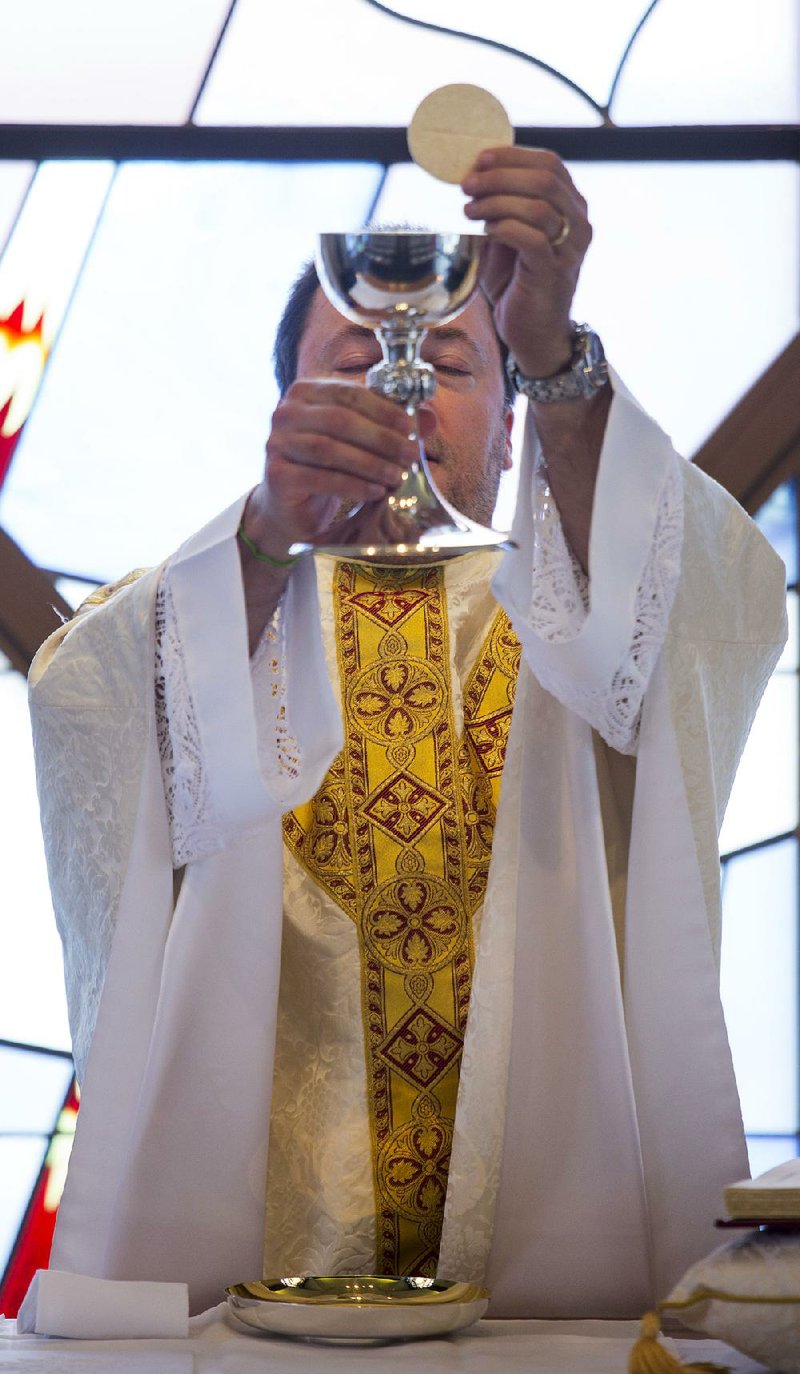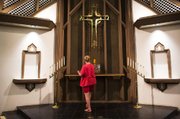Traditions vary among Christian denominations and among some of the world's other major faith groups when it comes to the treatment of holy texts and sacred spaces.
While some can't imagine disposing of a Bible, a Koran or any other sacred text, there are ways of respectfully handling holy books that are damaged beyond repair. When it comes to sacred space, the tradition in some Christian denominations is to consecrate or bless the building so it can be used as a house of worship.
For example, Episcopal, Catholic and Orthodox churches bless their houses of worship during special services or rituals. In the Catholic tradition during the Rite of Dedication, the priest will rub blessed oil onto the altar, which symbolizes Christ as the anointed one. Holy water is then sprinkled around the room and incense is burned to symbolize prayers rising to the heavens.
A similar service is held to bless Episcopal churches.
The Rev. Carey Stone, rector of St. Luke's Episcopal Church in North Little Rock, said if a church building is sold to a nonchurch entity, a service of deconsecration is held.
"If it's going to be a warehouse or an apartment, it has to be deconsecrated and we have a whole liturgy for that," Stone said.
The liturgy is included in the denomination's Book of Occasional Services, which also includes suggestions for other special services and blessings. The congregation recently used such a blessing for its new pulpit to prepare it for sacred use.
Likewise, when items used for worship are no longer usable or damaged beyond repair, they are not simply tossed out.
"Sometimes, for example, altar cloths fall into disrepair to the point where they can no longer be used, and they are burned so they aren't used as a tablecloth at somebody's barbecue," Stone said.
For Stone, it comes down to the Episcopal view that "matter matters."
"There is a sense of honor about matter, about our bodies, about the things you can touch and handle that are sacred," Stone said. "We are very conscious of that. It's back to finding the sacred in the ordinary. God is in the details."
Stone said the blessings and proper disposal are done to honor the sacred purpose of the building or objects.
"It's sort of like the human body. It has a sacred purpose of carrying our souls around, and when it can no longer fulfill that purpose, it is buried or cremated. It's honoring what has been and making sure it's not desecrated in some way."
SPECIAL TREATMENT
The consecrated wine and bread of the Eucharist or Communion are handled with particular care in some denominations. In the Episcopal Church, when the elements of Communion have been blessed, they are viewed as the real presence -- the body and blood -- of Christ. After the service, any leftover wine must be consumed or disposed of in a special sink called a piscina, which has a pipe that leads directly into the ground.
"You don't want the consecrated wine going into the city sewer," Stone said.
The bread can be held in reserve to use again, but when that's not possible, the bread is spread in a parishioner's garden.
The Rev. Nicholas Verdaris, priest at Annunciation Greek Orthodox Church in Little Rock, said churches within the Orthodox tradition are also consecrated for use as sacred space.
"It's a formal service, an ancient rite," he said.
One of the key elements of the service is the entombment of the relics of saints within the altar.
"It establishes a very clear sense that the church draws breath from the sacrifice and the work of those who have gone before us," he said. "Every parish has a connection with 2,000 years of Christendom. It's not just a local experience because buried within that church are the remains of saints, and that church then becomes hallowed ground."
When Annunciation Church moved from downtown Little Rock to its current location on Napa Valley Drive, the entire altar was moved in one piece so the relics would not be disturbed and a new altar was built around it.
Other objects also receive special treatment. Vestments are used until the priest dies and then are bequeathed to the next priest or to another parish. Objects used in worship, such as the chalice, are kept even after they are no longer usable, often stored in the altar. Items such as palm fronds, holy water or flowers used in worship services are also treated respectfully.
"They don't have magical powers, but it's that sense of respect," Verdaris said. "They were used in the context of prayer and to help manifest the presence of God in people's lives, so when they go over to decay we return them respectfully to the earth."
The blessed wine and bread of Communion are treated with the utmost reverence. Verdaris said any remaining elements are consumed by the priest after the service. There also are special procedures for dealing with the water from baptisms.
"When we baptize someone, the water is then drained in an underground reservoir underneath the church. It's not returned to the plumbing system," Verdaris said. "The grace that blesses that water forms the foundation of that parish and fertilizes the very soil the church is built on."
Verdaris said Bibles are never discarded.
THE SACRED HOME
For Jews, their sacred text is the Torah scroll, which contains the five books of Moses -- Genesis, Exodus, Leviticus, Numbers and Deuteronomy. Torah scrolls are also never to be discarded. Rabbi Barry Block of Congregation B'nai Israel in Little Rock said if a Torah scroll is damaged beyond repair, it would be buried.
"It's not only the Torah scroll that we bury, but prayer books that can no longer be used or anything with the name of God printed on it," Block said. "Jews consider anything with the name of God on it to be sacred. So we don't simply throw those things into the garbage."
The scrolls and prayer books and other written material are placed in what's called a geniza, or a repository for old books.
"The idea of burial is that you are treating it as sacred as the vessel of a human soul, which is how we regard the body," Block said. "One custom is to bury the sacred object with a person when you bury them as an honor to that person."
As for sacred space, a synagogue would be blessed for use, but the most sacred place is the home, Block said.
"That's the most sacred place," he said. "The home really is the center of Judaism."
To consecrate a home, a mezuzah is placed on the doorpost. A mezuzah is a small case that contains a handwritten scroll that includes a Jewish prayer from Deuteronomy known as the Shema. It serves as a reminder of their connection to God and of their heritage.
"We do that with a blessing so that consecrates the home, which is called in our tradition a 'small sanctuary,'" Block said.
While the blessing ceremony at a synagogue would be more elaborate, Block said, the intent is the same, and a mezuzah is also placed on the doorpost.
Jews also have a ritual for consecrating a cemetery because Jewish burials are supposed to take place on consecrated ground.
"For many, many Jewish communities, the first physical location that they own is a cemetery," Block said. "You could have your services in a new Jewish community and your classes in a rented space or home, but you need a permanent place for burial."
Unlike some Christian churches that deconsecrate houses of worship when they are sold or no longer of use, the Jewish tradition is much like what happens when someone sells his house.
"If the person purchasing the home is Jewish, you are to leave the mezuzah, and if not, you are supposed to take it," Block said. "So I think similarly if you were to sell a synagogue you might have a ritual because the community would need that, but technically what's required is to remove the mezuzah."
The Koran, the sacred text in Islam, is also treated with respect. Sarwar Alam, an instructor who teaches in the King Fahd Center for Middle East Studies at the University of Arkansas at Fayetteville, said if a Koran is damaged beyond repair, the preferred way of disposing of it is to bury it respectfully.
The second method would be to sink it in flowing water. The third option is burning and the last would be to store it in a cave or place of permanent storage, much like the Dead Sea Scrolls.
The same guidelines of immersion, burial or burning are also used by some Hindus for disposal of their holy texts.
Religion on 06/06/2015


